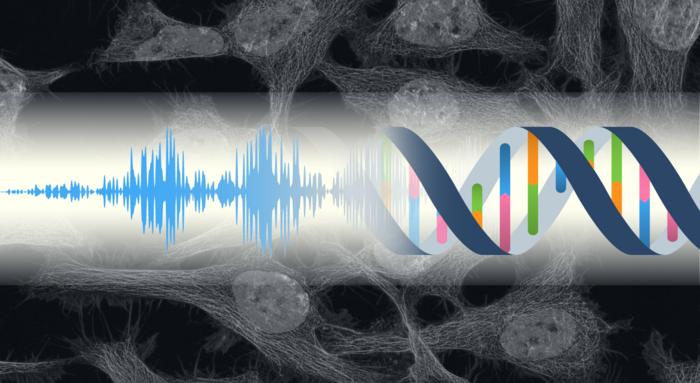In a groundbreaking study emerging from Kyoto University, researchers have unveiled compelling evidence that cells within the human body are capable of perceiving sound—an ability previously attributed only to specialized sensory organs such as ears and the brain. This remarkable discovery challenges long-held assumptions about the boundaries of sensory perception and opens new frontiers in cellular mechanobiology and acoustic biology.
At its core, sound is defined by compressional mechanical waves propagating through various media, be it air, water, or bodily tissues. These waves cause fluctuations in pressure, which historically are understood to be detected primarily by auditory organs. Yet the research led by Masahiro Kumeta and his team probes deeper, exploring how acoustic pressure waves at physiological sound levels might directly interface with cultured cells, inducing measurable biological responses.
To explore this phenomenon experimentally, the Kyoto University scientists devised an innovative system that exposes cultured cells to controlled acoustic waves. This involved attaching a vibration transducer in an unconventional upside-down orientation on a laboratory shelf, amplifying sound signals through a digital audio player connected to an amplifier. These acoustic emissions were then transmitted to the cellular environment via a diaphragm linked to the culture dish, allowing precise modulation of sound pressure experienced by cells.
The study’s cellular subjects were bathed in acoustic waves within the audible spectrum, simulating the natural sound environment present in body tissues, known as body-conducted sound. Subsequent analyses employing RNA sequencing, advanced microscopy, and other experimental techniques uncovered a suite of cellular activities influenced by sound stimulation. Notably, approximately 190 genes demonstrated sensitivity to acoustic modulation, revealing a complex genetic network responsive to mechanical cues conveyed by sound waves.
One of the most striking revelations was the suppressive effect of acoustic stimulation on adipocyte differentiation—the biological process in which precursor cells mature into fat cells. This finding carries significant implications for biomedical research, suggesting the possibility of leveraging sound as a non-invasive modality to control cellular and tissue states, potentially influencing metabolic health and combating obesity-related disorders through mechanotransductive pathways.
The mechanistic underpinnings unraveled by the team’s investigation highlight alterations in cell adhesion properties and subcellular signal transduction pathways instigated by acoustic stimulation. These mechanosensitive genetic circuits convey sound-induced mechanical stress into biochemical signals, thereby orchestrating changes in cell physiology. This represents a novel mechanistic framework for understanding how cells interpret and convert physical stimuli from their environments into functional outcomes.
This research also provokes a fundamental re-examination of perception itself. Traditionally viewed as a phenomenon confined to organs equipped with specialized receptors, perception now expands into the cellular realm, where individual cells become active processors of environmental acoustics. This paradigm shift suggests that acoustic perception may be more pervasive and integral to biological functionality than previously understood.
Furthermore, the study posits sound as a uniquely advantageous tool in medicine and healthcare due to its intangible nature. Unlike chemical or physical interventions that involve material agents, acoustic stimulation offers a non-material, non-invasive, and immediate method to influence cells directly, minimizing risks of toxicity or adverse side effects. Such attributes could herald novel therapeutic strategies that employ sound waves to modulate cellular behavior safely and effectively.
By demonstrating a tangible link between acoustic waves and gene expression modulation, the Kyoto University team’s work enriches the emerging field of mechanobiology, which examines how mechanical forces and physical properties affect cellular behavior. Coupling this with insights into body-conducted sound further bridges gaps between physics, biology, and medicine, underscoring the interdisciplinary nature of modern scientific inquiry.
Looking ahead, this pioneering research evokes numerous questions that beckon further exploration. How do diverse cell types across tissues respond differently to acoustic stimulation? Could tailored acoustic signals be designed to promote regeneration, inhibit pathological cell differentiation, or manipulate immune responses? Answering these questions could revolutionize approaches to treatment across a spectrum of diseases.
The implications extend beyond human health; understanding cellular acoustics might reveal how organisms communicate at fundamental levels, influencing developmental biology, neurobiology, and even ecological interactions. As such, acoustic modulation stands as a promising frontier in decoding the language of life itself, spoken not only through chemistry and genetics but also through vibrations and sound waves.
Culminating a multi-year effort, this research was published in the journal Communications Biology on April 16, 2025, under the title "Acoustic modulation of mechanosensitive genes and adipocyte differentiation." Supported by prominent Japanese funding bodies including the Japan Society for the Promotion of Science, Japan Science and Technology Agency, Murata Science Foundation, and Mitsubishi Foundation, the study represents a collaborative and well-resourced endeavor advancing the scientific community’s understanding of cell-environment interactions.
The study’s findings underscore a transformative perspective: cells are not merely passive elements within organisms but are dynamically attuned to their acoustic environments, capable of translating sound stimuli into meaningful biological processes. This opens exciting vistas for both fundamental science and practical applications, heralding an era where sound waves may be harnessed to fine-tune cellular function and promote health in unprecedented ways.
Subject of Research: Cells
Article Title: Acoustic modulation of mechanosensitive genes and adipocyte differentiation
News Publication Date: 16-Apr-2025
Web References: http://dx.doi.org/10.1038/s42003-025-07969-1
Image Credits: KyotoU/Kumeta lab
Keywords: Acoustic waves, Sound transmission, Cell responses, Sensory perception, Environmental health, Sound pressure, Adipocytes




